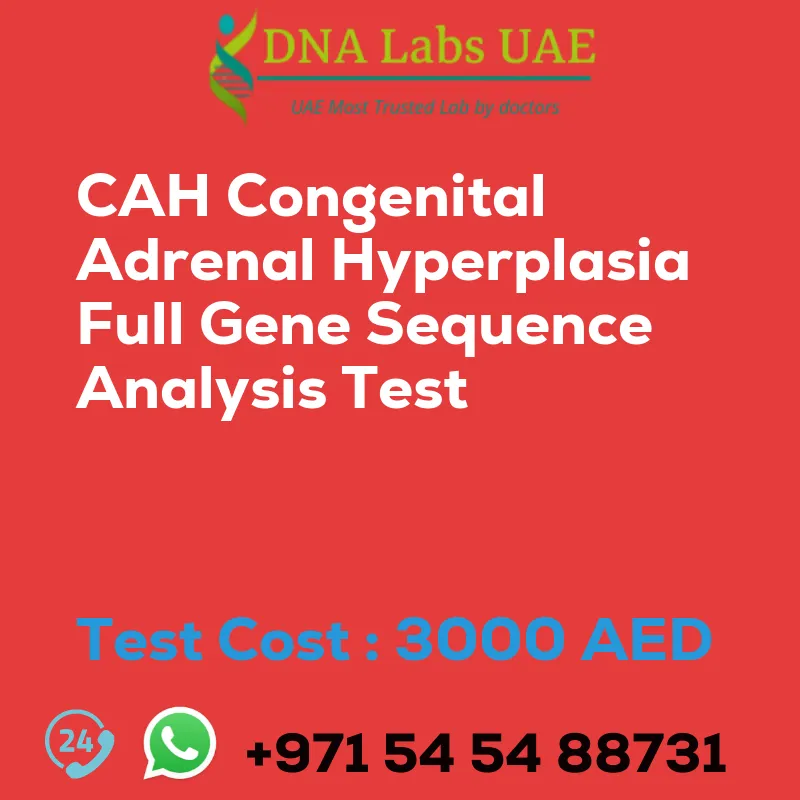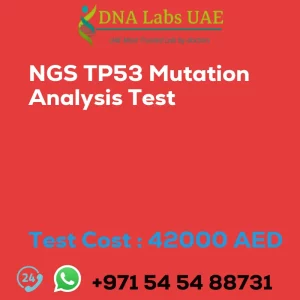CAH Congenital Adrenal Hyperplasia Full Gene Sequence Analysis Test
Test Name: CAH Congenital Adrenal Hyperplasia full gene sequence analysis Test
Components: EDTA Vacutainer (2ml)
Price: 3000.0 AED
Sample Condition: Peripheral blood
Report Delivery: 2-3 weeks
Method: Sanger Sequencing
Test Type: Genetics
Doctor: Gynecologist
Test Department: Pre Test Information
CAH (Congenital Adrenal Hyperplasia) full gene sequence analysis can be done with a doctor’s prescription. Prescription is not applicable for surgery and pregnancy cases or people planning to travel abroad.
Test Details
Congenital Adrenal Hyperplasia (CAH) is a group of inherited disorders that affect the adrenal glands. It is caused by mutations in the genes responsible for producing enzymes involved in the production of cortisol, aldosterone, and androgens.
A full gene sequence analysis for CAH involves analyzing the entire coding region of the genes associated with the condition. The genes commonly involved in CAH include CYP21A2, HSD3B2, and CYP11B1.
CYP21A2 gene mutations are the most common cause of CAH. This gene provides instructions for producing an enzyme called 21-hydroxylase, which is involved in the production of cortisol and aldosterone. Mutations in this gene can result in a deficiency of 21-hydroxylase, leading to the accumulation of androgens and the development of CAH.
HSD3B2 gene mutations can also cause CAH. This gene provides instructions for producing an enzyme called 3-beta-hydroxysteroid dehydrogenase, which is involved in the production of all steroid hormones, including cortisol and aldosterone. Mutations in this gene can lead to a deficiency of 3-beta-hydroxysteroid dehydrogenase, resulting in the accumulation of androgens and the development of CAH.
CYP11B1 gene mutations are less common but can also cause CAH. This gene provides instructions for producing an enzyme called 11-beta-hydroxylase, which is involved in the production of cortisol and aldosterone. Mutations in this gene can lead to a deficiency of 11-beta-hydroxylase, causing an accumulation of androgens and the development of CAH.
A full gene sequence analysis for CAH involves sequencing the entire coding region of these genes to identify any mutations or variations that may be present. This analysis can help diagnose CAH, determine the specific genetic cause, and guide treatment and management options for affected individuals.
| Test Name | CAH Congenital Adrenal Hyperplasia full gene sequence analysis Test |
|---|---|
| Components | EDTA Vacutainer (2ml) |
| Price | 3000.0 AED |
| Sample Condition | Peripheral blood |
| Report Delivery | 2-3 weeks |
| Method | Sanger Sequencing |
| Test type | Genetics |
| Doctor | Gynecologist |
| Test Department: | |
| Pre Test Information | CAH (Congenital Adrenal Hyperplasia)full gene sequence analysis can be done with a Doctors prescription. Prescription is not applicable for surgery and pregnancy cases or people planing to travel abroad. |
| Test Details |
Congenital Adrenal Hyperplasia (CAH) is a group of inherited disorders that affect the adrenal glands. It is caused by mutations in the genes responsible for producing enzymes involved in the production of cortisol, aldosterone, and androgens. A full gene sequence analysis for CAH involves analyzing the entire coding region of the genes associated with the condition. The genes commonly involved in CAH include CYP21A2, HSD3B2, and CYP11B1. CYP21A2 gene mutations are the most common cause of CAH. This gene provides instructions for producing an enzyme called 21-hydroxylase, which is involved in the production of cortisol and aldosterone. Mutations in this gene can result in a deficiency of 21-hydroxylase, leading to the accumulation of androgens and the development of CAH. HSD3B2 gene mutations can also cause CAH. This gene provides instructions for producing an enzyme called 3-beta-hydroxysteroid dehydrogenase, which is involved in the production of all steroid hormones, including cortisol and aldosterone. Mutations in this gene can lead to a deficiency of 3-beta-hydroxysteroid dehydrogenase, resulting in the accumulation of androgens and the development of CAH. CYP11B1 gene mutations are less common but can also cause CAH. This gene provides instructions for producing an enzyme called 11-beta-hydroxylase, which is involved in the production of cortisol and aldosterone. Mutations in this gene can lead to a deficiency of 11-beta-hydroxylase, causing an accumulation of androgens and the development of CAH. A full gene sequence analysis for CAH involves sequencing the entire coding region of these genes to identify any mutations or variations that may be present. This analysis can help diagnose CAH, determine the specific genetic cause, and guide treatment and management options for affected individuals. |








